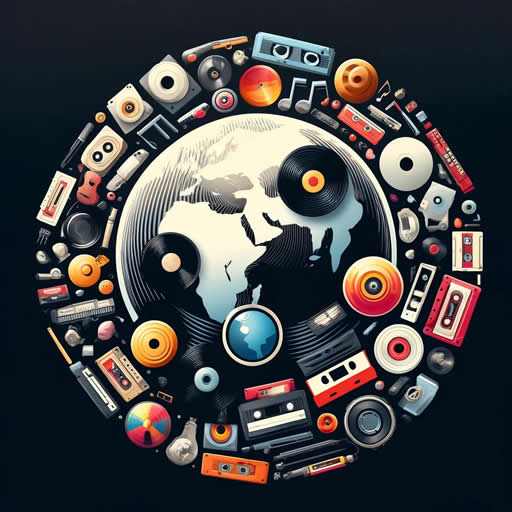Jukebox Machines in Pop Culture: Famous Appearances and Their Impact
Few objects in pop culture are as iconic as the jukebox. From diners and dance halls to films and music videos, jukeboxes have become a symbol of nostalgia and rebellion, often evoking a sense of community and timeless fun. Over the years, these music machines have appeared in countless famous movies, TV shows, and pop culture moments, helping to cement their status as cultural icons. In this article, we’ll explore some of the most famous jukebox appearances in pop culture and examine their lasting impact on entertainment and society.
Jukeboxes in Movies: Setting the Scene
Jukeboxes have long been a favorite prop in movies, often used to evoke a sense of nostalgia or to set the tone for a particular scene. Whether it’s the background soundtrack to a pivotal moment or the centerpiece of a high-energy dance-off, jukeboxes are woven into the fabric of cinematic history.
Grease (1978)
One of the most famous jukebox appearances in film comes from the beloved musical Grease. Set in the 1950s, a golden age for jukeboxes, the movie features multiple scenes in which characters gather around the jukebox at the diner to play their favorite tunes. The jukebox helps define the retro vibe of the film, capturing the spirit of youth culture at the time, when rock ‘n’ roll was king, and jukeboxes were at the heart of every social gathering.
Pulp Fiction (1994)
Quentin Tarantino’s Pulp Fiction is another classic film where the jukebox plays a crucial role. The famous scene in Jack Rabbit Slim’s diner, where John Travolta and Uma Thurman’s characters have a twist contest, is anchored by the sounds coming from the diner’s jukebox. Tarantino’s use of the jukebox underscores the film’s homage to mid-century American culture, blending the music with the retro atmosphere of the setting.
The Shawshank Redemption (1994)
In The Shawshank Redemption, the jukebox becomes a symbol of freedom and escape. One memorable scene features the prisoners enjoying a rare moment of relaxation as they listen to classical music played over the prison’s public address system. While not a jukebox in the traditional sense, this moment captures the power of music in providing a temporary escape from harsh realities, much like a jukebox offers people a break from their everyday lives.
Jukeboxes on TV: A Cultural Staple
Beyond the silver screen, jukeboxes have made numerous appearances on television, often becoming central to the atmosphere of certain iconic shows.
Happy Days (1974-1984)
No discussion of jukeboxes in pop culture would be complete without mentioning Happy Days. The jukebox at Arnold’s Diner served as a central feature throughout the show, often seen as the place where Fonzie, Richie, and their friends gathered to listen to music. The jukebox in Happy Days didn’t just play music; it was a character in its own right, reflecting the carefree, nostalgic feel of the show and becoming a symbol of the 1950s teenage experience.
Friends (1994-2004)
In the hit TV show Friends, the gang often gathered at Central Perk, a coffee shop with a vintage-style atmosphere that included a jukebox. While the jukebox wasn’t featured in every episode, it was part of the background, adding to the show’s cozy, communal vibe. The inclusion of the jukebox was a subtle nod to the music machines of the past, grounding the show in a timeless appeal.
Music Videos and Jukeboxes: The Perfect Pairing
Jukeboxes have also made their mark in music videos, often used to symbolize fun, rebellion, or a love for classic rock and roll.
Bruce Springsteen – “Dancing in the Dark” (1984)
In Bruce Springsteen’s iconic music video for “Dancing in the Dark,” a jukebox sits in the background, adding to the video’s barroom atmosphere. Springsteen’s connection to working-class Americana and timeless rock music makes the inclusion of the jukebox a fitting symbol of his roots and the simple joys of playing a favorite song in a familiar setting.
Billy Joel – “Piano Man” (1973)
While not a music video in the modern sense, Billy Joel’s famous song “Piano Man” evokes images of a jukebox in a small bar. The song’s lyrics paint a picture of regulars in a bar who are soothed by the piano man’s music, a scene easily associated with the warm, familiar tunes of a jukebox. It’s a song that, even today, would feel right at home on a jukebox in any local bar.
The Impact of Jukeboxes in Pop Culture
Jukeboxes have come to symbolize more than just a way to play music—they represent an entire era of social interaction, self-expression, and rebellion. In films, jukeboxes often act as a gateway to the past, giving viewers a glimpse of a time when music was communal, and everyone gathered around the jukebox to hear the latest hits.
In TV shows and music videos, the jukebox is often used as a backdrop to signify timelessness, helping to bridge the gap between the past and the present. Even in today’s digital world, where music can be accessed with a tap on a phone, the jukebox remains an enduring symbol of the joys of physical music and shared experiences.
For collectors, jukeboxes represent a piece of history that can bring the magic of music to life in their homes. If you’re considering adding a jukebox to your collection, be sure to explore this page of jukeboxes for sale for a range of options, from vintage models to modern classics.
A Lasting Cultural Icon
From movies like Grease and Pulp Fiction to TV shows like Happy Days, the jukebox has cemented its place in pop culture as a symbol of music, nostalgia, and community. Its appearances on the big and small screens have only reinforced its status as an icon of the past, one that continues to resonate with audiences today. Whether featured in a retro diner or as a background prop, the jukebox will always hold a special place in the hearts of music lovers and collectors alike.
